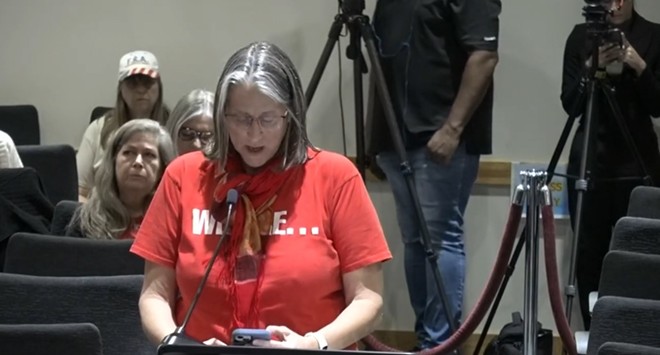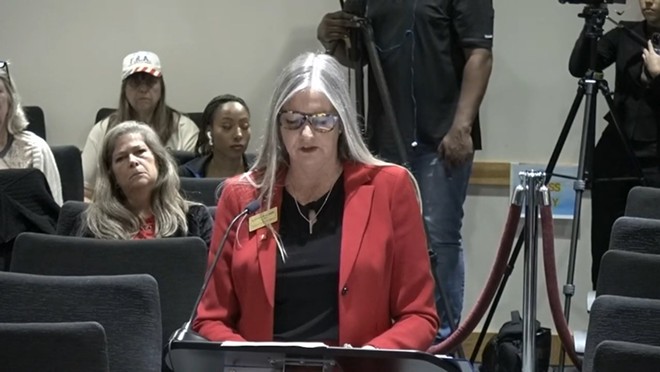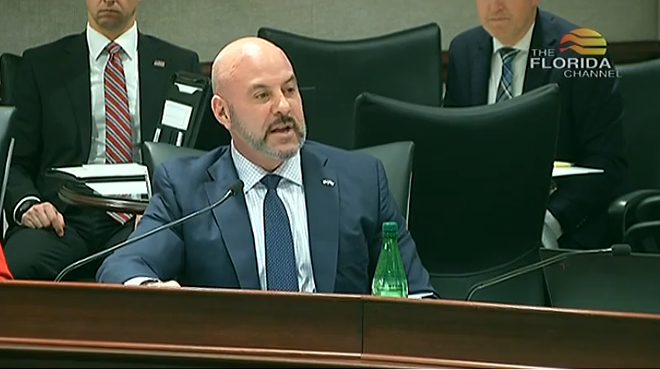
A third-party attorney hired by the Volusia County school board wrote a letter to the state’s Public Employees Relations Commission (PERC) last month, alleging the union had failed to comply with a controversial law passed last year that requires public sector unions (with politically convenient exceptions) to report certain information to the state annually.
Under the new law, public sector unions — save for those representing firefighters, cops and corrections officers, unions that reliably contribute to GOP campaigns — are required to have a dues-paying membership of at least 60% of employees that the union represents. Unions are then required to report their membership numbers, and other financial information, to the state annually.
Under Florida’s right-to-work law, public employees aren’t required to pay union dues in order to reap the benefits of a union contract that covers their job. So, reaching a 60% threshold (i.e., convincing workers to voluntarily support their union financially) can, in Florida and other right-to-work states, be a challenge.
Elizabeth Albert, president of Volusia United Educators in Daytona Beach, told Orlando Weekly that her union submitted the required information (including membership numbers) to the state in October 2023, using guidance the union had received from PERC, the state agency tasked with implementing last year’s law.
“We stand on telling the truth,” she asserted. The Volusia County school board, however, has cast doubt on the union’s calculation. A private attorney, writing on behalf of the school board, sent a formal notice to PERC on Jan. 18, insinuating that the union had falsified information, specifically to make it appear as though they had surpassed the required 60% membership threshold.
“The board did not take a legal position, but merely notified PERC that the union representations did not appear to meet statutory density requirements by the recertification deadline," a spokesperson for Volusia County Schools told Orlando Weekly in a statement. Albert believes this interference was unnecessary and described the board's move as “disappointing” and “malicious.”
According to public records, the union reported 62% membership density in October for the union’s instructional bargaining unit in a recertification form submitted to PERC, and about 42% membership density for their non-instructional bargaining unit (representing educational support staff and office specialists). All in all, that totals about 3,400 dues-paying members for the school district.
Based on numbers the union shared in a monthly newsletter for its members, however, the school board believes that the information submitted to PERC is inaccurate. Membership information shared by the union in its August “Solidarity Report” — two months before the union submitted their numbers to PERC — showed the union hadn’t yet reached the 60% membership threshold for either of its bargaining units. The instructional bargaining unit had about 52% density, while the support staff unit hovered a bit below 30% density.

Albert, the union president, told Orlando Weekly that the union's membership is fluid. “We are constantly adding members and sometimes removing them,” she said. As of Friday morning, she noted, the union had eight new members in their system waiting to be processed. “No one is forced to join or remain.”
The August newsletter, reviewed by Orlando Weekly, also noted that there were 216 additional union members at the time who were still in the process of converting to the union’s new system for paying member dues — a necessity borne out of last year's law.
The state law passed last year — like similar anti-union policies enacted in states like Kentucky and Arkansas — prohibited a decades-old practice of allowing union members to have their union dues deducted automatically from their paychecks.
Florida Gov. Ron DeSantis described this payroll deduction ban as “paycheck protection” (borrowing the phrase from the American Legislative Exchange Council, a right-wing think tank that pushes for similar policies across the country). Florida union members, including self-described conservatives, last year decried it as a nuisance and an attack on their freedom to pay their dues as they wished.
Albert says the union, nonetheless, has worked to remain in compliance with the law, and was shocked by the school board’s decision to contact the state. “The [board] has inserted themselves in the process unnecessarily, and we believe that not only is it inappropriate, but it is mean-spirited and [done] in an attempt to potentially decertify our union.”
“The [board] has inserted themselves in the process unnecessarily, and we believe that not only is it inappropriate, but it is mean-spirited and in an attempt to potentially decertify our union.”
tweet this
Albert says the union always strives to operate from a place of truth and integrity, both internally with members and externally with the district and school board. Lying to the state about their membership numbers, she added, wouldn’t be in the union’s best interest, and is antithetical to what the union stands for. “It wouldn't benefit us to falsify any information, when we could just, instead of taking one road, take another road.”
This other road she’s referring to is what happens if a union’s membership does fall below 60%. If that happens, the union isn’t automatically decertified. Union members don’t automatically lose their contract, which — for teachers — can contain things such as scheduled pay raises, duty-free lunch time and dedicated time for lesson planning.
What happens instead is that unions must file a new petition with PERC to represent its members. At least 30% of eligible employees must sign cards confirming that they want the union. Then, an election takes place. If a simple majority of workers vote in favor of union representation — 50% + 1 vote — the union stays. If 50% or fewer vote in favor, then the union is decertified.
The state’s largest teachers union — the United Teachers of Dade — is currently in the midst of this process, after just barely failing to meet its 60% threshold. A spokesperson for the Florida Education Association, the parent union of most local education unions around the state, told Orlando Weekly last month that at least 21 other education unions in Florida are in a similar boat.
Last month, Albert publicly called out the five-member Volusia County school board at a Jan. 23 school board meeting for going to the state without coming to her first.
“The Volusia County School Board have taken it upon yourselves to lobby unfounded attacks on the members of VUE [Volusia United Educators] for no reason other than to stoke suspicion where there is none,” Albert told board members.
Ahhh @volusiaschools is attempting to union bust the @VUEUnion.
— Anonymous Teacher (@VPSTeacher) January 24, 2024
Hear the @VUEPresident speak to the board 👇🏾🏴☠️
Full video : https://t.co/JYp5NXB2Jg pic.twitter.com/lLSKqhqUlS
The reason for this “attack,” she continued, was “to make sure that teachers and support staff no longer have a voice, that we no longer have contractual rights and that we no longer have the ability to fight for better pay benefits and working conditions.”
Karen Weinrich, an elementary school teacher for Volusia County Schools, told board members that she and many of her fellow teachers make a conscious choice to be dues-paying union members. “Why? It's because we want our schools to be better,” said Weinrich, who sits on the union's executive board. “We are here for our students. And as a union, it gives us a voice.”
Learning of the board's decision to contact the state, to cast doubt on their union's integrity, she said, “felt like a punch in the gut.”
Albert told Orlando Weekly that she tried to contact board members to ask after their accusation of noncompliance, but that no one returned her calls or emails. Even worse, two of the school board members, she said, were former card-carrying union members themselves and had been endorsed by the union for elected office. (Albert politely declined to call them out by name.)
Historically, the union has had a “collaborative” relationship with the school district and the school board, according to Albert. “The relationship has been mutually beneficial.”
But casting doubt on their union by filing a public notice with the state, she said, feels like an “intentional” and “strategic” move to undermine them. Since the law took effect in July, the process for determining how unions should count and report their membership totals to the state has shifted through PERC’s rulemaking process, which occurred over the course of several months.
The school board has accused the union of using a misleading method to calculate its membership totals. Albert maintains that the union used guidance documents provided by PERC at the time of their recertification due date in October.
It’s been a confusing affair for all involved, including for the firefighter and cop unions that were supposed to be exempted from most of the law’s most stringent regulations. The law’s primary champions (or bill sponsors) have sponsored new legislation this year to try and address the vague directives in last year’s bill.
Meanwhile, as this drama unfolds, Albert says Volusia County Schools continues to face an ongoing teacher shortage — an issue that is unlikely to get better if the union is decertified and the teachers' contract is lost.
As of Saturday, Feb. 3, Volusia County Schools had 115 instructional vacancies — a number that Albert said is unusually high for this time of year. The school district also faces other issues, such as salary compression for longtime teachers, disruptive student behavior in classrooms, and ongoing logistical troubles associated with a 2021 U.S. Department of Justice lawsuit over the district’s treatment of students with disabilities.
There are also general workplace concerns. Weinrich told board members at the Jan. 23 meeting that her classroom's air conditioner hasn't worked since August.
“The board would be better served working with us collaboratively, to hear the concerns that the employees have, and work with us to make improvements,” said Albert. “But instead of working collaboratively with our union, they are attempting to take away the ability of the employees to belong to our union.”
Follow us: Apple News | Google News | NewsBreak | Reddit | Instagram | Facebook | Twitter | or sign up for our RSS Feed





















